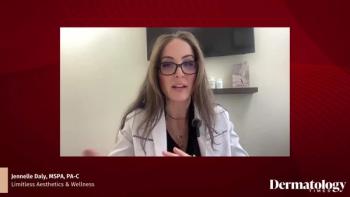
The Cutaneous Connection: Combatting Treatment Skepticism in Advanced Pediatric Atopic Dermatitis
Peter Lio, MD, discusses pearls and takeaways from the atopic dermatitis panel he participated in at the 2023 Society of Pediatric Dermatology meeting.
Transcript
Dermatology Times®: Hi, and welcome to The Cutaneous Connection, a podcast from the staff at Dermatology Times aiming to provide you with the latest news of dermatology, exclusive interviews with leading industry experts, and a glimpse at what goes on behind the scenes. I'm your host, Emma Andrus.
I'm joined by Peter Lio, MD, clinical assistant professor of dermatology and pediatrics at Northwestern University Feinberg School of Medicine in Chicago, Illinois, and founder of the Chicago Integrative Eczema Center. In this episode, Dr. Lio discusses pearls and takeaways from the atopic dermatitis panel he participated in at the 2023 Society of Pediatric Dermatology meeting in Asheville, North Carolina, addressing skepticism of treatment options for advanced forms of the condition.
Peter Lio, MD: I'm Peter Lio. I'm a clinical assistant professor of dermatology and pediatrics at Northwestern University in Chicago, Illinois. I'm also a founding partner of Medical Dermatology Associates of Chicago.
And today, we had a really neat session on atopic dermatitis. We had 3 different opinions and 3 different panelists who took different pathways, if you will. One of them was talking about all the new and exciting treatments, of which there is a ton. So Dr. Paller really broke down a lot of the new topicals and systemics, and the fact that we now have a biologic agent down to patients 6 months of age, which is pretty amazing.
Then Dr. Steve Feldman from Wake Forest talked all about adherence to our regimens, and just how important that is, and how it's really our problem. If we're not getting our patients to adhere, it means we don't have the proper buy-in. So I thought that was kind of fascinating, and thinking about how we can do better on that, that's an area we have to improve.
And then I talked a little bit about integrative approaches and thinking about how we can use some of the non-traditional techniques and treatments to help improve the patient experience overall, and to really meet some of the unmet needs in areas where we might never get medications, because they're gentler and more supportive-type treatments. So I talked about black tea compresses, I talked about topical indigo naturalis, I even talked talked a little bit about how oral hemp seed oil was shown to help reduce some of the symptoms of atopic dermatitis. And really, it's in the spirit of finding things to help meet our patients part of the way.
I think we see both extremes. We see the whole gamut, but the 2 extremes are on 1 hand, I have families who sort of don't want to use anything that's sort of not natural: 'I don't want chemicals, I don't want drugs, it's too much stuff.' And I'm sympathetic to a certain degree. We live in this weird, modern world where almost nothing we do is close to nature. On the other extreme, sometimes we have this pressure to start using some of these better things. People don't even want to start with the basics. They just get it better, quick fix. Let's go. And that was one of the really good questions that was brought up at the end: 'Do you feel comfortable using some of these more powerful treatments in babies? Do we always need it?' And so I think there is this tension and everything in between. So I think really trying to reassess each situation, each individual, make sure have we done all the right things. Have we gone through with good education? Are we sure it's the right diagnosis? Are we sure they're comfortable using the simplest and safest treatments? And did those really fail us? And if so, if they're still having trouble, because we know this can cause a huge burden of disease, a lot of impact on quality of life, and not just for the patient, but for the whole family. Sometimes the whole family comes in, everybody has bags under their eyes, everybody is sobbing; I feel it, my mood just drops. And the moment I walk in there, I'm like, 'Oh, my goodness, you guys are really, really suffering.' And so in that case, I think it's much clearer that we need to do something bigger; we need to make a change.
But there are other cases where I think sometimes, I've even maybe been too aggressive. And patients say, 'Do we need to do that yet? Let's hold your horses.' So we're always trying to find that equanimity to sort of balance it correctly, and that is the art, I think, of medicine.
There are so many unmet needs, and so many questions. And in fact, I think that we're in this phase, I like to call it: the virtuous cycle of drug development. We get a medicine, and that helps us learn a little bit more about the condition atopic dermatitis here, which then allows for better treatments, which then allows for a refinement in our understanding, and so on. So we're in this virtuous cycle. Now, so many things, we still have some of the basic questions that we don't understand, we still don't really know what causes it. If you asked me point blank: What is the cause? I'll kind of tell you a few different things that we think are related to it. We think there are some genes that are associated with it. There's some environmental things, but I can't really give you, especially for an individual patient, why. So that's huge. We're also still trying to understand the role of the microbiome. We're trying to understand: 'Can we prevent it in people that we think are at higher risk?' Because we know there's certainly a genetic component and a family component. Can we do that? Can we find other ways to help with the mind body piece, the behavioral aspect? There's a huge, huge unmet need there, because a lot of my patients will tell me, even if they're not having a flare up, stress can induce one. So what does that tell us? That there's more to this than just bacteria. There's more to this than just dry skin. There's more to this than just inflammation. This is a complex disease with many, many different facets.
I think this is a problem for everybody, even for non specialists. I think atopic dermatitis is so common. There are estimates as high as 20% of children being affected by this, so I think pediatrics, family practice, all throughout medicine, we're seeing this, and it affects, of course, the family, so maybe you're seeing an adult patient for internal medicine, but they're exhausted, and then you ask, 'What's going on?' 'Our baby has terrible eczema.' So these are a drain for so many people and a drain on society, and I think that's why it's one of those things that we can really rally together. I want all the good ideas. I want all the help I can get. I have no ego when it comes to this because I keep learning. I keep getting schooled on it, and that's what I want. It's a bad day when I don't learn something new about this really tough to treat disease.
Dermatology Times: For more Dermatology Times content, from articles to videos and podcasts, visit www.dermatologytimes.com.
[Transcript has been edited for clarity.]
Newsletter
Like what you’re reading? Subscribe to Dermatology Times for weekly updates on therapies, innovations, and real-world practice tips.









